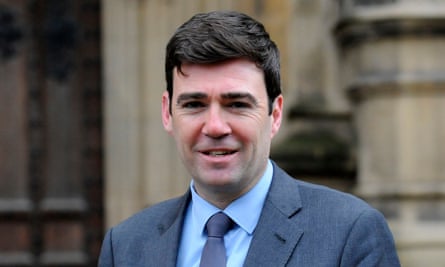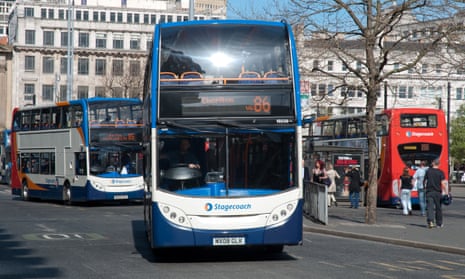Buses and the Conservatives have rarely got along. Even if Margaret Thatcher didn’t really say that any man over 26 riding on a bus is a failure, her ministers did draw up the deregulation that doomed many services.
Boris Johnson splurged hundreds of millions to create an unreliable new double-decker for London. Most seriously of all, David Cameron’s government slashed grants to operators and funding to councils, leading to the widespread disappearance of local bus services across the country.
In London, buses are regulated by an authority and fares have been frozen. Elsewhere, services are being pared back and prices are rising. Passenger journeys have fallen to their lowest level in a decade: dipping under 5 billion annually across Britain, and to 4.4 billion in England – half of which are in the capital.
Yet an unlikely concession by a former Conservative chancellor has given transport authorities reason to hope. The Bus Services Act 2017, pinned to the regional devolution championed by George Osborne, could allow more areas to take back control and run routes and services as they see fit.
Manchester is likely to be the first to press ahead. Andy Burnham, the mayor, is blunt about his city’s bus system: “It’s confusing, it’s overpriced, a system where the private interest dominates over the public interest.”
More than 30 companies now run services in Greater Manchester, deciding their own routes, timetables and fares. Deregulation opened local markets to all comers and the result has been confusion and poor service, according to Burnham. Speaking to the Observer, he says: “We have ludicrous situations where people are told they can’t get on because the driver has no change. We don’t have audiovisual announcements, or real-time information.” Operators do track services, but Manchester lacks the comprehensive information other cities enjoy, he says. “What we want is a system that integrates with the rest of the transport system, is affordable, and has modern vehicles with ramps so people aren’t left at the bus stop.”
Smart, integrated ticketing should reduce the price of travel, Burnham says. “You can pay £3 for a journey – double London prices – and when you get to Metrolink [trams] it’s as if you haven’t spent anything. We need a daily cap.”
The act, which came into effect in December, allows Manchester to push for either “enhanced partnerships”, where bus operators improve networks in return for greater council assistance, or London-style franchising, where specific routes are contracted out to a single operators. A public consultation will help Manchester choose its path in late 2018;
Stagecoach, one of the two biggest operators in the city, has made its objections clear to franchising. The act gives Burnham considerably more power than when Tyne and Wear tried to regulate buses two years ago, but threats of legal challenge from operators would not be a surprise.

However, Burnham insists: “Buses are going to change in Greater Manchester – no doubt.” Deregulation was a disaster, he says, cutting journeys from 350 million to 210 million a year: “We are suffering from the effects, in increasing congestion.”
While buses can reduce traffic, congestion has harmed their journey times and passenger demand across urban areas – even, lately, in London. Transport for West Midlands regards congestion as the main problem for a bus network that, though deregulated and served by 24 companies, is dominated by one, National Express.
Some commuters still lose out through the lack of a unified service. Waiting in the winter chill to get into central Birmingham from the suburb of Harborne, Sarah Maisey, 17, has chosen a cheaper pass that only works on National Express, rather than all operators. But, she says, “the buses are not reliable, especially in this weather. My bus comes every 13 minutes and when it comes it’s full.”
Natalie Hodgkins, a 31-year-old social worker, says buses past her house were suspended during recent snow. “It is my only option. And it gets more and more expensive every year.” Congestion has worsened over the nine years she’s lived in Harborne, her journey now taking up to an hour and a half: “I could have flown somewhere nicer in that time.”
Compared with many areas, the West Midlands is well served: a longstanding alliance agreement between councils and operators has driven improvements to vehicles and information.
Outside cities, the outlook remains dire. The Campaign for Better Transport (CBT) found in 2017 that bus funding in England and Wales had been cut by a third since 2010; more than 500 routes were reduced or withdrawn in 2016-17, including more than 100 in Oxfordshire alone. The start of 2018 looks no better: Kent has earmarked 78 services for possible closure to save £4m. Cuts have also seen bus fares rise even faster than rail fares.
The act gives hope, according to the campaign’s Lianna Etkind, but, she says, “Without long-term, sustainable funding from central government, buses will continue to decline.”
“It is desperately challenging,” agrees Claire Haigh, chief executive of Greener Journeys, which campaigns for greater use of buses and coaches. But she is hopeful: “If ever there was a time to harness the possibility of buses it’s now.” She says buses built to the latest EU anti-pollution standards are “miraculously clean” compared to their predecessors. “The air-quality crisis is a public health emergency: and the bus is the great solution.”

Comments (…)
Sign in or create your Guardian account to join the discussion